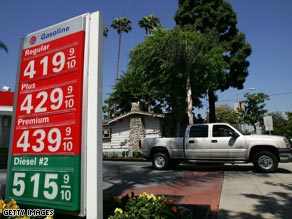WASHINGTON (CNN) -- Before departing the White House early Monday for a farewell tour of Europe, President Bush stole a page from his predecessor and suggested he feels American consumers' pain.

Democrats and Republicans are deadlocked over how to address the rising gas prices.
"A lot of Americans are concerned about our economy," Bush said. "I can understand why. Gasoline prices are high, energy prices are high. I do remind them that we have put a stimulus package forward that is expected to help boost the economy. And of course, we'll be monitoring the situation."
Americans are looking for more action, though, than monitoring the situation.
But while gas prices keep soaring, the chances of Washington finding a solution keep dropping because Democrats and Republicans are deadlocked over how to fix the problem.
Bush talks mostly about increasing supply through more oil drilling in places like Alaska's Arctic National Wildlife Refuge.
"I've proposed to the Congress that they open up ANWR, open up the Continental Shelf, and give this country a chance to help us through this difficult period by finding more supplies of crude oil, which will take the pressure off the price of gasoline," Bush said Monday. ![]() Watch how Congress could affect gas prices »
Watch how Congress could affect gas prices »
But Democrats like House Speaker Nancy Pelosi are vehemently opposed to increasing production on environmental grounds, so the president's plan has virtually no chance of passage in the current Congress.
In turn, Democrats talk mostly about lowering demand for gasoline through research into alternative fuels -- something the president talks about too -- and more funds for mass transit.
"It's got to involve investing in alternative fuels, so that we can have some alternatives to gas and significant investment in public transit," Virginia Gov. Tim Kaine, a key supporter of Barack Obama's presidential bid, said Sunday.
These types of plans will take a long time to implement, so no quick fix there either.
And with the federal government now more than $9 trillion in debt, where would Congress find the money to pour into public transit and research into alternative fuels?
With the parties deeply divided on solutions, it's not surprising that last week a Senate bill requiring major cuts in greenhouse-gas emissions failed.
Only 48 of 100 senators voted for it amid charges by White House press secretary Dana Perino that the bill would have a devastating impact on the economy and thus might not really help cut the price in gasoline.
But six absent senators, including Obama and Republican John McCain, said they would have voted yes to end debate and move forward on the bill. That led some in Congress to declare that Congress will have the momentum to take action next year on reducing America's dependence on foreign oil.
All that means, however, is that there's optimism the next president might be able to find an energy compromise in 2009.
In other words, don't expect any help from Washington any time soon.Original here



No comments:
Post a Comment